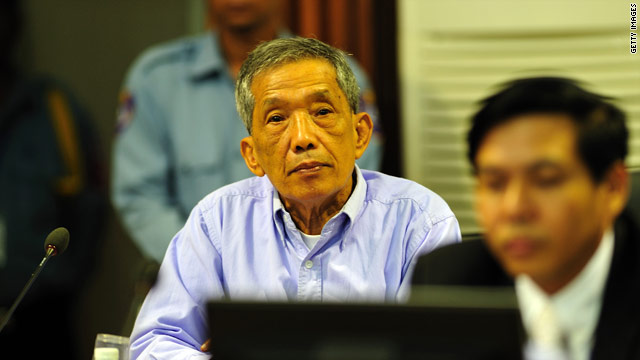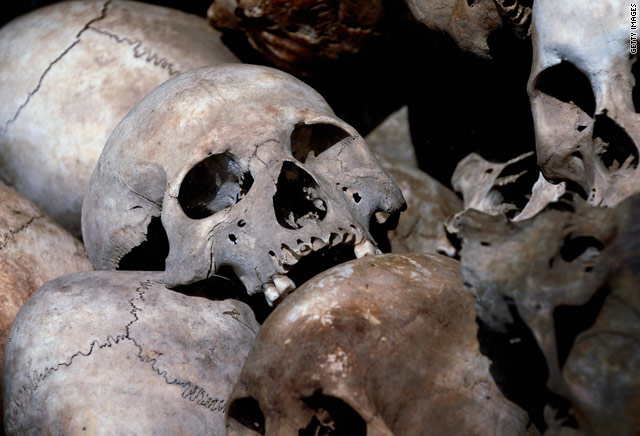August 25, 2010

Kaing Guek Eav, also known as "Duch" sits in the courtroom July 26, 2010 in Phnom Penh province.
STORY HIGHLIGHTS
- Attorneys: Duch was "a witness of the events" and should be in witness protection
- Duch is convicted of war crimes, crimes against humanity, murder and torture
- Prosecutors: 30-year sentence is too light
RELATED TOPICS
(CNN) -- Lawyers for a man who ran a notorious torture prison in Cambodia where more than 14,000 people died during the 1970s Khmer Rouge regime are appealing his conviction.
The lawyers for Kaing Guek Eav, alias Duch, say he should be acquitted since he was "a witness of the events of the relevant period" and should be in witness protection -- not detention.
Duch was convicted of war crimes, crimes against humanity, murder and torture in July in a U.N.-backed war crimes tribunal also known as the Extraordinary Chambers in the Courts of Cambodia.
Duch's lawyers also say the court did not have jurisdiction, the appeal states.
"To interpret the applicable law in reliance on international customary law is inconsistent" with the law of the Extraordinary Chambers in the Courts of Cambodia, according to the appeal.
Earlier this month, prosecutors in Cambodia appealed Duch's 30-year sentence, saying the punishment was too light.
"The co-prosecutors are of the view that the judgment gives insufficient weight to the gravity of Duch's crimes and his role and his willing participation in those crimes," they said in a statement. "At the same time, the co-prosecutors believe that undue weight is placed on any mitigating circumstances applicable to Duch."
Some survivors had been angered by the sentence for Duch.
His prison term would have been about 19 years after the court took off 11 years for the time he has already served behind bars.
The verdict sparked strong reactions as word spread outside the courtroom. Some said it made them lose faith in the U.N.-backed war crimes tribunal.
"It's becoming a sham," Cambodian-American Theary Seng, chairwoman of the Center for Justice and Reconciliation, said after the verdict.
At least 1.7 million people -- nearly a quarter of Cambodia's population -- died under the 1975-1979 Khmer Rouge regime from execution, disease, starvation and overwork, according to the Documentation Center of Cambodia.
Duch, 67, was the head of the S-21 prison. Few people brought to the prison made it out alive; only about a dozen were found by the Vietnamese, who invaded Cambodia in 1979.
Prosecutors had initially sought a 40-year sentence. The judges first gave Duch 35 years, but took five years off that for the time he was illegally detained before the tribunal was established.
Prosecutors have said the judgment failed "to reflect the full extent of Duch's criminal conduct" and he should be "separately convicted of the crimes against humanity of enslavement, imprisonment, torture, rape, extermination, and other inhumane acts. These crimes should not have been subsumed into the crimes of persecution and torture."
The judge, in announcing Duch's sentence, said he took into consideration that the defendant had expressed remorse, admitted responsibility and cooperated with the court. The judge also took into account the "coercive environment" of the Khmer Rouge, he said
Duch pleaded guilty, but he said he was only following orders and asked for forgiveness. Last November, he asked to be freed after spending some 11 years in detention.
In the last week of his trial, Duch argued that international law did not apply to him because he was following orders.
The tribunal began its work in 2007 after a decade of on-and-off negotiations between the United Nations and Cambodia over the structure and functioning of the court. Duch's verdict was the court's first.
Another four of the ultra-Maoist regime's former leaders are waiting to see if they will stand trial before the U.N.-backed tribunal for war crimes and crimes against humanity.
Co-prosecutors filed a final submission in these cases and asked that the four be indicted and sent for trial, according to a statement from the prosecutors' office. It's not known when the court will make a decision.
The lawyers for Kaing Guek Eav, alias Duch, say he should be acquitted since he was "a witness of the events of the relevant period" and should be in witness protection -- not detention.
Duch was convicted of war crimes, crimes against humanity, murder and torture in July in a U.N.-backed war crimes tribunal also known as the Extraordinary Chambers in the Courts of Cambodia.
Duch's lawyers also say the court did not have jurisdiction, the appeal states.
"To interpret the applicable law in reliance on international customary law is inconsistent" with the law of the Extraordinary Chambers in the Courts of Cambodia, according to the appeal.
Earlier this month, prosecutors in Cambodia appealed Duch's 30-year sentence, saying the punishment was too light.
"The co-prosecutors are of the view that the judgment gives insufficient weight to the gravity of Duch's crimes and his role and his willing participation in those crimes," they said in a statement. "At the same time, the co-prosecutors believe that undue weight is placed on any mitigating circumstances applicable to Duch."
Some survivors had been angered by the sentence for Duch.
His prison term would have been about 19 years after the court took off 11 years for the time he has already served behind bars.
The verdict sparked strong reactions as word spread outside the courtroom. Some said it made them lose faith in the U.N.-backed war crimes tribunal.
"It's becoming a sham," Cambodian-American Theary Seng, chairwoman of the Center for Justice and Reconciliation, said after the verdict.
At least 1.7 million people -- nearly a quarter of Cambodia's population -- died under the 1975-1979 Khmer Rouge regime from execution, disease, starvation and overwork, according to the Documentation Center of Cambodia.
Duch, 67, was the head of the S-21 prison. Few people brought to the prison made it out alive; only about a dozen were found by the Vietnamese, who invaded Cambodia in 1979.
Prosecutors had initially sought a 40-year sentence. The judges first gave Duch 35 years, but took five years off that for the time he was illegally detained before the tribunal was established.
Prosecutors have said the judgment failed "to reflect the full extent of Duch's criminal conduct" and he should be "separately convicted of the crimes against humanity of enslavement, imprisonment, torture, rape, extermination, and other inhumane acts. These crimes should not have been subsumed into the crimes of persecution and torture."
The judge, in announcing Duch's sentence, said he took into consideration that the defendant had expressed remorse, admitted responsibility and cooperated with the court. The judge also took into account the "coercive environment" of the Khmer Rouge, he said
Duch pleaded guilty, but he said he was only following orders and asked for forgiveness. Last November, he asked to be freed after spending some 11 years in detention.
In the last week of his trial, Duch argued that international law did not apply to him because he was following orders.
The tribunal began its work in 2007 after a decade of on-and-off negotiations between the United Nations and Cambodia over the structure and functioning of the court. Duch's verdict was the court's first.
Another four of the ultra-Maoist regime's former leaders are waiting to see if they will stand trial before the U.N.-backed tribunal for war crimes and crimes against humanity.
Co-prosecutors filed a final submission in these cases and asked that the four be indicted and sent for trial, according to a statement from the prosecutors' office. It's not known when the court will make a decision.




No comments:
Post a Comment